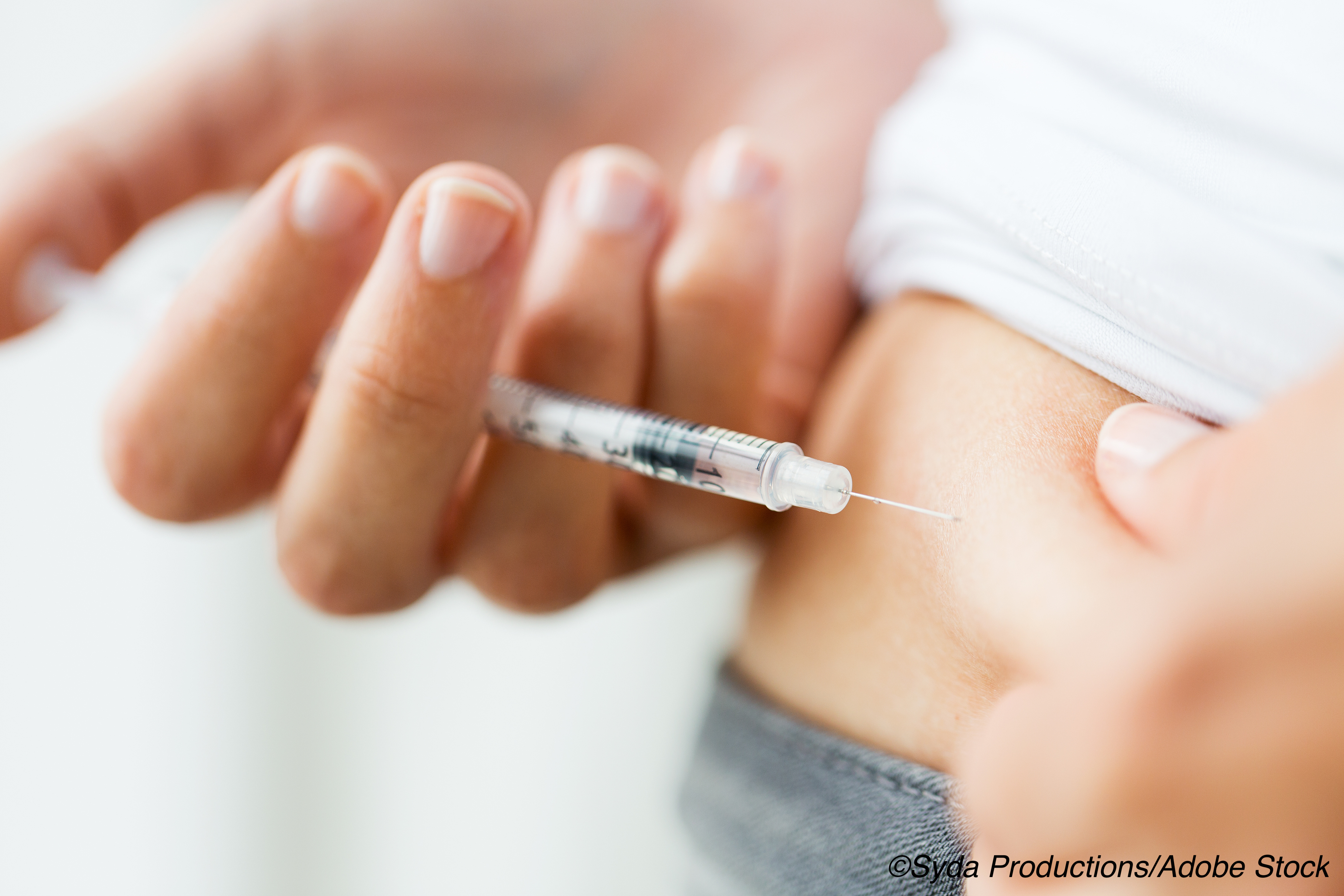 A once-weekly basal insulin analogue, insulin icodec, which is still in development for the treatment of diabetes, was as effective and as safe as once-daily insulin glargine U100 for patients with type 2 diabetes, according to a randomized, double-blind, double dummy phase II trial.
A once-weekly basal insulin analogue, insulin icodec, which is still in development for the treatment of diabetes, was as effective and as safe as once-daily insulin glargine U100 for patients with type 2 diabetes, according to a randomized, double-blind, double dummy phase II trial.
The findings were reported at the European Society for the Study of Diabetes (EASD) virtual congress and published online by The New England Journal of Medicine.
The 26-week trial found that the weekly insulin icodec, like daily insulin glargine, resulted in glycemic control without significantly affecting rates of clinically relevant hypoglycemia (level 2 or 3) in patients with type 2 diabetes that had been inadequately controlled with metformin with or without a dipeptidyl peptidase 4 inhibitor, Julio Rosenstock, MD, from the Dallas Diabetes Research center at Medical City, Dallas, Texas, and colleagues wrote. “During the trial, a similarly robust reduction in the glycated hemoglobin level was observed with both drugs, with more than two thirds of patients reaching a glycated hemoglobin level of less than 7%; the reduction in the fasting plasma glucose level was also similar in the two groups, and greater improvements in the 9-point patient-measured blood glucose profile were observed with once-weekly insulin icodec than with once-daily glargine, which is currently the most commonly used basal insulin analogue.”
As the authors pointed out, once-weekly insulin icodec would help patients better manage their insulin and reduce their injections from 365/year to 52. Better patient adherence to treatment regimens has been shown in studies of injectable once-weekly glucagon-like receptor peptide 1 (GLP-1) receptor agonists over once-daily treatment, Rosenstock and colleagues noted, and patient satisfaction was also shown to be higher without sacrificing gylcemic control.
“Extrapolating these data to our trial results could suggest that once-weekly insulin icodec has the potential to improve treatment satisfaction, adherence, and persistence in patients who are going to receive basal insulin,” Rosenstock and colleagues noted.
Fewer injections might also help initiate insulin therapy in patients for patients who are new to taking insulin.
In their study, Rosenstock and colleagues randomized 247 patients to either once weekly icodec plus a daily placebo injections or once daily glargine plus a once-weekly placebo injection. The study period was conducted over 26 weeks with 5 weeks of follow-up.
To be included in the trial, patients had to be 18-75 years old with a diagnosis of type 2 diabetes at least 180 days prior to screening. They had to be receiving stable daily doses of metformin with or without dipeptidyl peptidase 4 inhibitor and have a glycated hemoglobin level of 7.0-9.5%. They also could not have previously received long-term insulin; however, short-term insulin treatment (no longer than 2 weeks) and insulin treatment for gestational diabetes was allowed.
The primary endpoint for the trial was the change in glycated hemoglobin level from baseline to week 26. Safety was also evaluated.
Both groups has similar baseline glycated hemoglobin of 8.09% (icodec group) and 7.96% (glargine group).
“The estimated mean change from baseline in the glycated hemoglobin level was −1.33 percentage points in the icodec group and −1.15 percentage points in the glargine group, to estimated means of 6.69% and 6.87%, respectively, at week 26; the estimated between-group difference in the change from baseline was −0.18 percentage points (95% CI, –0.38 to 0.02, P = 0.08),” the study author wrote.
They also noted that the hypoglycemia with blood glucose level of <54 mg/deciliter (level 2) or severe cognitive impairment (level 3) was low — icodec group, 0.53 events per patient-year; glargine group, 0.46 events per patient-year; estimated rate ratio, 1.09; 95% CI, 0.45 to 2.65).
The patients who received icodec were started on a dose of 70 U once a week, and those who received glargine were started on 10 U daily. “After randomization, insulin doses were adjusted weekly to achieve a pre-breakfast patient-measured blood glucose target of 70 to 108 mg per deciliter (3.9 to 6.0 mmol per liter),” Rosenstock and colleagues wrote. .
Adverse events occured in about half of the patients in each treatment arm, with 2 serious adverse events occuring in 2 patients in the icodec arm, and 12 in the glargine arm. These were not related to the trial medications, the researchers noted.
More than half of the trial participants were male, most were age 59 or older. The participants had diabetes for 9 or more years, and about 20% of them reported a diabetes complication, the most common being microvascular such as diabetic neuropathy.
The researchers did note several limitations of the trial — it was not powered to detect significant differences between treatments; insulin treatment was not tailored for each treatment; and patients taking sulfonylureas were excluded and therefore further research needs to be done on a more diverse patient population.
-
A once-weekly basal insulin analogue, insulin icodec, is as effective and as safe as once-daily insulin glargine for patients with type 2 diabetes.
-
Be aware that this drug is still in development and not yet approved by the FDA.
Candace Hoffmann, Managing Editor, BreakingMED™
This study was funded by Novo Nordisk.
Rosenstock disclosed grants for research or travel, as well as consultant agreements with a variety of commercial entities including Applied Therapeutics, AstraZeneca, Boehringer Ingelheim, Eli Lilly and Company, Genentech, GlaxoSmithKline, Intarcia, Janssen Biotech, Lexicon Pharmaceuticals, Novartis, Novo Nordis, Oramed, Pfizer, REMO Biotherapeutics, and Sanofi US Services, Inc.
Cat ID: 12
Topic ID: 76,12,730,446,12,187,413,192,669,918,925,412


